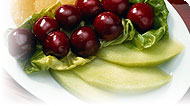Gluten Free
What does following a gluten-free diet mean? That you're embarking on an easy diet with a wide range of health-promoting effects. Instead of dwelling on what you’re giving up, consider that you’re going to enjoy a whole new world of delicious food options to meet your special dietary needs. You’ll be eating seasonally, choosing more fresh fruits and vegetables, focusing on meats, seafood, poultry, legumes, lentils, corn, and rice, and discovering fascinating ancient grains such as quinoa, amaranth, and millet. You’ll be able to eat potatoes, eggs, most cheeses, even chocolate (!)—and enjoy them without guilt because you’ll be taking good care of your body. In fact, you’ll probably end up eating—and feeling—better than ever!
Visit this page for more information about living Gluten Free
---
We carry a large variety of gluten free items, the brands listed below represent just some of the offerings we carry















More Diets
Low-Oxalate Diet

Why Do People Follow This Diet?
A hereditary condition can increase the risk of forming calcium oxalate stones. Intestinal resection, parathyroidism, and other more rare conditions also may cause renal calculi, and dietary factors can increase or reduce the risk of forming kidney stones. A low-oxalate diet is often prescribed for people who have increased levels of oxalic acid in their urine or who have a history of forming kidney stones. A treatment program including a low-oxalate diet and plenty of fluids reduces the risk of stone formation. A low oxalate diet is not always effective in reducing urinary oxalic acid levels because most oxalate found in urine is made in the body and does not come from the diet. People with a predisposition to stones are also encouraged to drink plenty of fluids (3 to 4 quarts [liters] per day), limit sodium intake, and consume adequate calcium, although calcium supplements should not be taken between meals.
Symptoms
In combination with calcium, the oxalic acid crystallizes to form kidney stones—small pebbles that form in either the kidney or the bladder. If these stones are small enough, they will pass out of the body without being noticed. However if too large, they can cause severe pain, obstruction of the flow of urine, and sometimes infection in the urinary tract.
Copyright © 2025 TraceGains, Inc. All rights reserved.
Learn more about TraceGains, the company.
The information presented by TraceGains is for informational purposes only. It is based on scientific studies (human, animal, or in vitro), clinical experience, or traditional usage as cited in each article. The results reported may not necessarily occur in all individuals. Self-treatment is not recommended for life-threatening conditions that require medical treatment under a doctor's care. For many of the conditions discussed, treatment with prescription or over the counter medication is also available. Consult your doctor, practitioner, and/or pharmacist for any health problem and before using any supplements or before making any changes in prescribed medications. Information expires December 2025.











